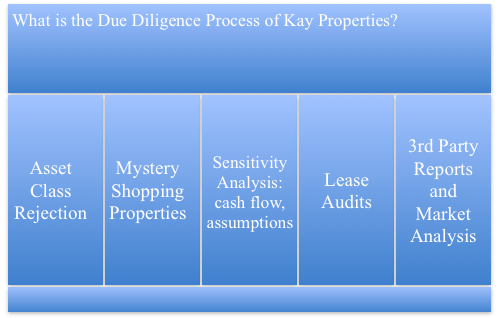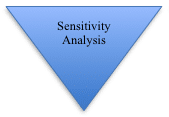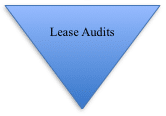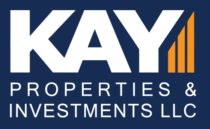One of the many things that sets Kay Properties and Investments apart from others is our extensive due diligence on DST 1031 properties.
At Kay Properties and Investments, we’re different than others—not just different in that we have participated in over $7 billion dollars of DST properties; not just different in that we have offices in Los Angeles, New York, and Washington DC; not just different in that we have access to most DSTs in the marketplace from many sponsors as well as client exclusive, off-market DSTs that are only available to clients of Kay Properties—but different in that we place a high priority on seeking to perform comprehensive DST due diligence. The Kay Properties Due Diligence Team is comprised of seasoned industry veterans who have performed due diligence, research, and analysis for regional and national commercial banks, private real estate companies, large real estate developers and international commercial real estate research firms.
In our opinion, many broker-dealers and financial advisors that offer DST 1031 properties perform very little to no due diligence. Now, they will tell you that they do, and this often means they are relying on a due diligence report commissioned and paid for by the product sponsor. These reports are often a regurgitation of the sponsor’s Private Placement Memorandum (PPM) which pose a serious and obvious conflict of interest as the sponsor is the client of the due diligence report provider and the one that is paying the report provider to write the report. It goes without saying that solely relying on the such as economic difficulties, tenant bankruptcies and other greater forces outside of any investor’s control. Real estate investments and DST properties contain absolutely no guarantees and we encourage all potential investors to carefully read the Private Placement Memorandum (PPM) paying careful attention to the risk section, prior to considering an investment sponsor provided due diligence report is a grave mistake.
Before going further, we must make note that conducting due diligence on a property or properties does not guarantee a successful investment. Due diligence is an important part of the investment process, however, investors need to be aware that properties with careful due diligence conducted on them could still end up underperforming projections as well as result in a complete loss of invested capital. This is due to a number of items that potentially cannot be foreseen such as economic difficulties, tenant bankruptcies and other greater forces outside of any investor’s control. Real estate investments and DST properties contain absolutely no guarantees and we encourage all potential investors to carefully read the Private Placement Memorandum (PPM) paying careful attention to the risk section, prior to considering an investment.

Understanding the Kay Properties DST Due Diligence Process
 No matter how much you “crunch the numbers” on high-risk assets it doesn’t change the fact that they are high-risk assets! At Kay Properties, although our competition continues to offer these high-risk asset classes (often because they have higher commissions than the lower risk asset classes), we have drawn a line in the sand that no matter how high the projected cash flow is, no matter how great the story of the asset class is, we WILL NOT use our clients as guinea pigs on investments that will likely continue to have very large losses for investors in the future. Over the years, investors have lost tens of millions of dollars investing in senior care facilities, hotels, and oil and gas investments. Kay Properties rejects the previously mentioned asset classes outright. Period.
No matter how much you “crunch the numbers” on high-risk assets it doesn’t change the fact that they are high-risk assets! At Kay Properties, although our competition continues to offer these high-risk asset classes (often because they have higher commissions than the lower risk asset classes), we have drawn a line in the sand that no matter how high the projected cash flow is, no matter how great the story of the asset class is, we WILL NOT use our clients as guinea pigs on investments that will likely continue to have very large losses for investors in the future. Over the years, investors have lost tens of millions of dollars investing in senior care facilities, hotels, and oil and gas investments. Kay Properties rejects the previously mentioned asset classes outright. Period.
 At Kay Properties and Investments, we also are different in that we strive to mystery shop virtually every DST property that we have clients invest in. A novel thought right? Visit the real estate as part of your due diligence. This level of boots on the ground review of the property and its neighborhood is unheard of in the DST industry. We have heard of no other broker-dealers or registered representatives placing the time, money, and energy into seeing virtually each and every DST like Kay Properties does. You can crunch the numbers all you want (which Kay Properties analysts love doing) but without visiting the property, your “due” has not been “done” and your “diligence” has not been “diligent.” At the time of writing we have Kay Properties team members as well as independent property inspectors that we have commissioned (these are often the same inspectors that Fannie Mae, Freddie Mac, CMBS Lenders, and other institutional investors commission) performing over 50 property tours on DST properties throughout the country. We strive to potentially perform these tours on virtually all properties in portfolio DSTs whereby one DST will have, for example, 10-20 individual properties in it.
At Kay Properties and Investments, we also are different in that we strive to mystery shop virtually every DST property that we have clients invest in. A novel thought right? Visit the real estate as part of your due diligence. This level of boots on the ground review of the property and its neighborhood is unheard of in the DST industry. We have heard of no other broker-dealers or registered representatives placing the time, money, and energy into seeing virtually each and every DST like Kay Properties does. You can crunch the numbers all you want (which Kay Properties analysts love doing) but without visiting the property, your “due” has not been “done” and your “diligence” has not been “diligent.” At the time of writing we have Kay Properties team members as well as independent property inspectors that we have commissioned (these are often the same inspectors that Fannie Mae, Freddie Mac, CMBS Lenders, and other institutional investors commission) performing over 50 property tours on DST properties throughout the country. We strive to potentially perform these tours on virtually all properties in portfolio DSTs whereby one DST will have, for example, 10-20 individual properties in it.
Now, others will tell you that yes, they go visit properties…. What they fail to mention to potential clients is that what they mean is that they are invited once or twice a year by product sponsors to fly out, tour a property and have a nice dinner as a marketing tool by the sponsor. Essentially, they will see 1-3% of the properties they work with per year. Hardly impressive. At Kay Properties, we take the time, effort and energy to see virtually all of the DST properties that we work with every year. We know of nobody else claiming this, as it is unheard of in the industry.
 Another item that we are focused on is sensitivity analysis and stress tests. At Kay Properties, we have proprietary models we have designed which take the sponsors’ assumptions about a property and apply pressure to them in an effort to help us further understand how certain circumstances will affect our investors. Items like physical occupancy, concessions, rental rates, vacancy rates, etc. are all inputted into proprietary models which we are able to run baseline tests on, and from there apply negative or positive pressure on them. This allows us to ascertain what the worst-case scenario for a property is, and from there to understand how likely that scenario is to potentially happen or not. Our stress tests provide a sophisticated level of analysis helping us to further understand potential risks that various scenarios can cause.
Another item that we are focused on is sensitivity analysis and stress tests. At Kay Properties, we have proprietary models we have designed which take the sponsors’ assumptions about a property and apply pressure to them in an effort to help us further understand how certain circumstances will affect our investors. Items like physical occupancy, concessions, rental rates, vacancy rates, etc. are all inputted into proprietary models which we are able to run baseline tests on, and from there apply negative or positive pressure on them. This allows us to ascertain what the worst-case scenario for a property is, and from there to understand how likely that scenario is to potentially happen or not. Our stress tests provide a sophisticated level of analysis helping us to further understand potential risks that various scenarios can cause.
 When analyzing a retail, office or industrial DST property, one of the incredibly important steps to focus in on is the property’s lease(s). The lease on a property can greatly affect that property’s value now and in the future. We always want to understand the property’s lease, what the tenants’ obligations are and what the landlord’s obligations are when it comes to the maintenance, taxes and insurance of the property. Is it an Absolute Triple Net (NNN) lease – where the tenant is responsible for ALL maintenance, taxes and insurance, a Triple Net (NNN) lease – where the tenant is not responsible for all of the previously mentioned items, but is responsible for a majority of them, a Double Net (NN) lease – whereby the landlord is typically responsible for the roof and structure of the building or a Gross lease – whereby the landlord is responsible for all maintenance, taxes and insurance costs? Does the tenant have any early termination clauses built into the lease? Are there any co-tenancy clauses built into the lease that could give the tenant an early out if a neighboring tenant were to vacate the building? Does the lease provide for annual rental increases, increases tied to the Consumer Price Index (CPI) or is it a flat lease for the entire term of the lease? We always seek to understand how the property’s lease will potentially affect that property’s value throughout the hold period and upon the eventual exit (sale) of the asset.
When analyzing a retail, office or industrial DST property, one of the incredibly important steps to focus in on is the property’s lease(s). The lease on a property can greatly affect that property’s value now and in the future. We always want to understand the property’s lease, what the tenants’ obligations are and what the landlord’s obligations are when it comes to the maintenance, taxes and insurance of the property. Is it an Absolute Triple Net (NNN) lease – where the tenant is responsible for ALL maintenance, taxes and insurance, a Triple Net (NNN) lease – where the tenant is not responsible for all of the previously mentioned items, but is responsible for a majority of them, a Double Net (NN) lease – whereby the landlord is typically responsible for the roof and structure of the building or a Gross lease – whereby the landlord is responsible for all maintenance, taxes and insurance costs? Does the tenant have any early termination clauses built into the lease? Are there any co-tenancy clauses built into the lease that could give the tenant an early out if a neighboring tenant were to vacate the building? Does the lease provide for annual rental increases, increases tied to the Consumer Price Index (CPI) or is it a flat lease for the entire term of the lease? We always seek to understand how the property’s lease will potentially affect that property’s value throughout the hold period and upon the eventual exit (sale) of the asset.
 When performing due diligence on a DST 1031 property we conduct a thorough review of the property’s third-party reports (the property appraisal, environmental report and property condition report—the inspection) that either the lender or sponsor ordered on the property as well as reports provided by commercial real estate research firms such as Costar, REIS, Real Capital Analytics, Axiometrics, etc. and large commercial real estate brokerage research departments. These reports are valuable in that they provide detailed insight into the building and market. Items such as comparable sales, comparable lease rates, comparable occupancy rates, market and sub-market development and employment trends and data, physical condition of the asset, projected repairs and improvements needed on an immediate and outgoing basis throughout the projected hold period, property environmental history and concerns, etc.
When performing due diligence on a DST 1031 property we conduct a thorough review of the property’s third-party reports (the property appraisal, environmental report and property condition report—the inspection) that either the lender or sponsor ordered on the property as well as reports provided by commercial real estate research firms such as Costar, REIS, Real Capital Analytics, Axiometrics, etc. and large commercial real estate brokerage research departments. These reports are valuable in that they provide detailed insight into the building and market. Items such as comparable sales, comparable lease rates, comparable occupancy rates, market and sub-market development and employment trends and data, physical condition of the asset, projected repairs and improvements needed on an immediate and outgoing basis throughout the projected hold period, property environmental history and concerns, etc.
In summary:
As noted earlier, you can do due diligence on bad deals all month long, but in the end, they are still bad deals. It is of utmost importance to be very selective and reject the exotic and high-risk property categories from a top down approach when it comes to beginning the due diligence process. Once all of the junk has been rejected, THEN it is time to dig in and deconstruct a property from a bottom-up approach utilizing mystery shopping, sensitivity analysis and stress tests, lease audits, third-party report reviews and market analysis, etc. Comprehensive DST due diligence—another way that Kay Properties is different than others.
This material does not constitute an offer to sell nor a solicitation of an offer to buy any security. Such offers can be made only by the confidential Private Placement Memorandum (the “Memorandum”). Please be aware that this material cannot and does not replace the Memorandum and is qualified in its entirety by the Memorandum.
This material is not intended as tax or legal advice so please do speak with your attorney and CPA prior to considering an investment.
This material contains information that has been obtained from sources believed to be reliable. However, Kay Properties and Investments, LLC, Growth Capital Services and their representatives do not guarantee the accuracy and validity of the information herein. Investors should perform their own investigations before considering any investment.
There are material risks associated with investing in real estate, Delaware Statutory Trust (DST) and 1031 Exchange properties. These include, but are not limited to, tenant vacancies; declining market values; potential loss of entire investment principal; that past performance is not a guarantee of future results; that potential cash flow, potential returns, and potential appreciation are not guaranteed in any way; adverse tax consequences and that real estate is typically an illiquid investment.
Please read carefully the Memorandum and/or investment prospectus in its entirety before making an investment decision. Please pay careful attention to the “Risk” section of the PPM/Prospectus. This material is not intended as tax or legal advice so please do speak with your attorney and CPA prior to considering an investment.
Please note that conducting due diligence on a property or properties does not guarantee a successful investment. Due diligence is an important part of the investment process, however, investors need to be aware that properties with careful due diligence conducted on them could still end up underperforming projections as well as result in a complete loss of invested capital. This is due to a number of items that potentially cannot be foreseen such as economic difficulties, tenant bankruptcies and other greater forces outside of any investor’s control. DST properties contain no guarantees as well as real estate contains no guarantees.
IRC Section 1031, IRC Section 1033, and IRC Section 721 are complex tax codes, therefore, you should consult your tax and legal professional for details regarding your situation.
Securities offered through registered representatives of Growth Capital Services, Member FINRA / SIPC. Kay Properties and Investments, LLC and Growth Capital Services are separate entities.
Multiple team members at Kay Properties & Investments, LLC, are licensed in all 50 states, Washington DC and the US Virgin Islands.
All real estate contains risk. Please read the full private placement memorandum for a discussion of each property’s business plan and risk factors. There are no guarantees for projected cash ow and/or appreciation. Please do not invest in real estate offerings if you cannot afford to lose your entire investment principal.

